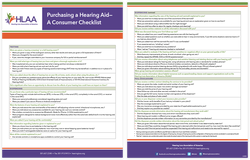Purchasing a Hearing Aid
For complete information, click here
HLAA's Purchasing a Hearing Aid Checklist - click here and
BE SURE to ASK for a TELECOIL in your hearing device!
Read why this is the most important feature in a hearing aids here!
BE SURE to ASK for a TELECOIL in your hearing device!
Read why this is the most important feature in a hearing aids here!

